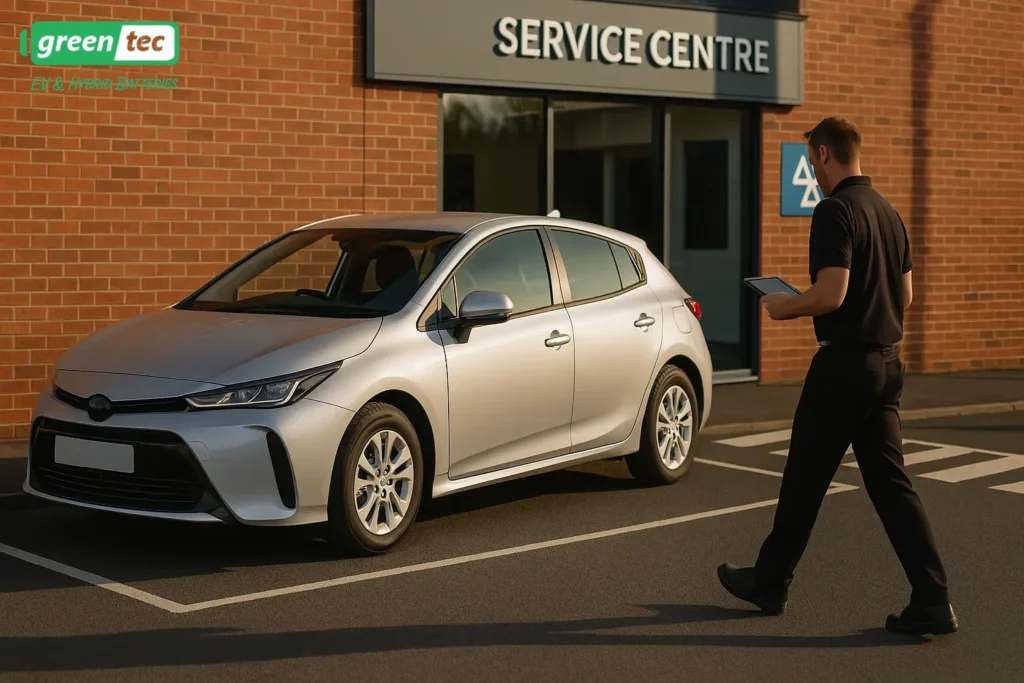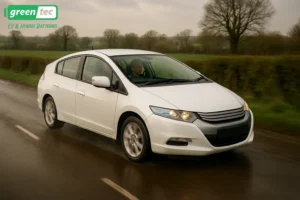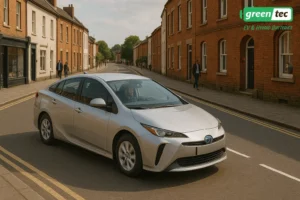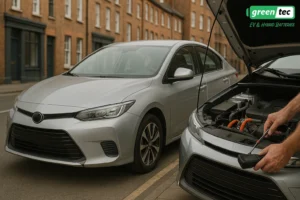Let’s be honest, we’ve all heard it. The classic line that goes something like, “A hybrid is great, but wait until you have to replace the battery! It’ll cost you a fortune and wipe out any savings.”
It’s a common fear and a big reason why some people are hesitant to buy a hybrid or are thinking about selling theirs. But what if I told you that this idea is, for the most part, a myth?
Let’s sit down and have a chat about the real costs of hybrid ownership in the UK. We’re going to break down the numbers, look at what’s really going on under the bonnet, and bust this myth once and for all.
It’s Not Just About the Battery
When people talk about hybrid running costs, they often focus solely on the potential hybrid battery replacement cost. But that’s only one piece of the puzzle. You need to look at the bigger picture, including fuel savings and overall maintenance.
Think about it like this: your car is an investment, and over its lifetime, you’ll put money into everything from fuel and insurance to MOTs and repairs. A hybrid saves you money in a few key areas that a traditional petrol or diesel car doesn’t.
First, there’s the obvious one: fuel. Because the electric motor assists the petrol engine, a hybrid is incredibly fuel-efficient, especially in urban stop-start traffic. That means fewer trips to the pump and a lot more money staying in your wallet.
According to the Society of Motor Manufacturers and Traders (SMMT), the market share for hybrid electric vehicles (HEVs) and plug-in hybrid electric vehicles (PHEVs) in the UK has consistently grown, demonstrating a clear shift in consumer preference. This wouldn’t be happening if they were more expensive to run in the long term.
Then there’s maintenance. A hybrid’s regenerative braking system uses the electric motor to slow the car down, which means significantly less wear and tear on the brake pads. This extends the life of your brakes and saves you money on replacements. The engine also works less, so there’s less stress on key components like the alternator, starter motor, and clutch, all of which can be very expensive to replace on a conventional car.
Forum Chatter: What Are Real Owners Saying?
We’ve been checking out some of the top UK car forums, and there’s a definite buzz around this topic. It’s clear that people are getting into the specifics, often with spreadsheets in hand, and the results are pretty eye-opening.
In a recent Reddit discussion, Prius owners compared their real-world running costs and experiences with hybrid batteries. Many highlighted that even when factoring in the possibility of a £2,000–£3,000 battery replacement, the fuel savings over 8–10 years often far outweigh that expense. One contributor broke it down to less than 2p per mile when you spread the cost across ownership, showing just how cost-effective hybrids can be in the long run.
The consensus from people who actually own and drive these cars is that the money they save on fuel and maintenance far outweighs the long-term cost of a battery replacement. It’s a great example of how the “hybrid battery replacement cost” fear often doesn’t hold up in the real world. In fact, many are reporting that the battery is lasting much longer than the initial 8-year warranty period, pushing past 12-14 years with proper care.
Breaking Down the Hybrid Battery Replacement Cost UK
So, let’s talk about the big one. Yes, a hybrid battery replacement isn’t cheap. But it’s also not the terrifying, budget-busting event many people imagine. The reality is much more manageable, especially with the options available today.
For popular models, like the Toyota Prius or the Honda Jazz, a replacement hybrid battery cost can range from £1,000 to £3,000. And for the vast majority of drivers, this is not a surprise repair that happens overnight. Most hybrid batteries come with a long warranty, often 8 to 10 years or 100,000 miles. By the time a replacement is needed, you’ve likely reaped years of fuel savings.
The cost also depends on your choice of repairer. A main dealership will almost always be more expensive. They’ll likely insist on a brand-new battery, which pushes up the price. An independent specialist, on the other hand, can offer you more affordable and just as reliable solutions.
Let’s look at some specifics for the models that come up most in search queries:
Toyota Hybrid Battery Replacement Cost UK
Toyota hybrids are a common sight on UK roads, which is good news for owners. Due to their popularity, there are more affordable options for Toyota hybrid battery replacement cost in the UK.
- Toyota Prius: As the original hybrid icon, the Prius has a well-established aftermarket. The Prius hybrid battery replacement cost typically ranges from £1,000 to £2,500 for a quality reconditioned battery.
- Toyota Yaris: For a smaller car, the toyota yaris hybrid battery replacement cost is often surprisingly reasonable, usually falling in the £1,200 to £2,000 range.
- Toyota RAV4: For the popular SUV model, the Toyota Rav4 hybrid battery replacement cost is generally in the middle-to-high end of the price spectrum, but still manageable for many owners.
Honda Hybrid Battery Replacement Cost
Honda is another major player in the hybrid market, and their batteries are known for their reliability. If you own a Honda Jazz, the hybrid battery replacement cost can be very competitive, particularly if you opt for a reconditioned unit.
The Case for Reconditioned Batteries
At Greentec Auto UK, we’re all about giving you smart, affordable options. That’s why we specialise in high-quality, reconditioned hybrid batteries.
So, what is a reconditioned battery? It’s a battery that has been fully tested and had any weak or failed cells replaced. We then meticulously re-balance the entire battery pack to ensure it performs just like it should. This isn’t just a quick fix; it’s a full refurbishment.
Choosing a reconditioned battery from a trusted specialist like us can significantly lower the cost to replace a hybrid battery, often by over 50%. It means you get the performance and reliability of a new battery, but without the eye-watering price tag. Plus, it’s a much more sustainable option, giving a second life to valuable materials.
What About a “Normal” Car?
While everyone’s focused on the hybrid battery, they often forget about the expensive repairs that a petrol or diesel car can have. Things like:
- A new clutch and flywheel: Can easily cost £1,000 to £2,000.
- A broken turbocharger: Often a £1,500+ repair.
- A failing head gasket: Can lead to a bill of over £1,000.
- A blocked Diesel Particulate Filter (DPF): A common issue that can cost anywhere from a few hundred to a couple of thousand pounds.
These are all parts that a petrol or diesel car has, and a hybrid either doesn’t have or puts much less stress on. When you factor in the high cost of these “traditional” repairs, the potential for a one-off hybrid battery replacement cost looks far less intimidating.
Conclusion: It’s All About Total Cost of Ownership
The “hybrid battery myth” is just that—a myth. When you look at the total cost of ownership, hybrids are almost always cheaper to run than their petrol or diesel equivalents. They save you money on fuel every single week, they have lower maintenance costs, and when the time does come for a battery replacement, there are now affordable, high-quality options available.
So, if you’re holding onto an old petrol car because you’re scared of a future battery bill, it might be time to reconsider. The money you’ll save on fuel could easily cover the cost of a replacement when it’s needed, and you’ll be driving a more efficient, quieter, and cleaner car for years to come.
Thinking about a hybrid battery replacement? Don’t let the myths stop you.
Schedule Your Mobile Installation
Ready to give your hybrid a new lease on life? Whether you own a Toyota, Honda, or another hybrid model, we can provide a professional, affordable battery replacement. Our reconditioned batteries come with a fantastic warranty and are installed by our expert mobile technicians for your convenience.
Click here to find your battery.
FAQs: Your Questions About Hybrid Batteries, Answered
How long do hybrid batteries really last?
Most hybrid batteries are designed to last the lifetime of the vehicle, often well over 150,000 miles. Manufacturers typically provide warranties of 8-10 years or 100,000 miles, so you’re covered for a long time. It’s a key reason why replacing hybrid car batteries is a long-term investment, not a frequent one.
What are the signs that my hybrid battery is failing?
A: The most common signs are a dashboard warning light (like a check engine light or a specific hybrid system warning), a noticeable decrease in fuel economy, and the car’s battery gauge showing erratic charging and discharging.
Is it possible to repair a hybrid battery instead of replacing it?
Yes! In many cases, hybrid batteries can be repaired, especially if only a few cells are failing. This is often the most cost-effective solution, and it’s a service a specialist like Greentec Auto can provide. We’ve found that battery repair and reconditioning are excellent ways to avoid the full hybrid battery replacement cost.
Is a reconditioned battery a good idea?
Yes, absolutely. A high-quality reconditioned battery from a reputable company is a fantastic choice. It offers significant cost savings over a new battery while providing reliable performance and coming with a solid warranty. When considering the replacement hybrid battery cost, this option provides the best of both worlds.
What’s the difference between a hybrid battery and an EV battery?
A hybrid battery is much smaller than an EV battery. It’s designed to work alongside a petrol engine to provide a boost in power and efficiency. An EV battery is much larger, as it’s the sole power source for the vehicle. This is why electric vehicle battery replacement cost is typically much higher than for a hybrid.
Does a new battery affect my car’s resale value?
Yes, a new or reconditioned battery with a warranty is a huge selling point. It provides peace of mind for the next owner, knowing they won’t have to worry about the hybrid battery replacement cost for many years to come, which can significantly boost your car’s resale value.




